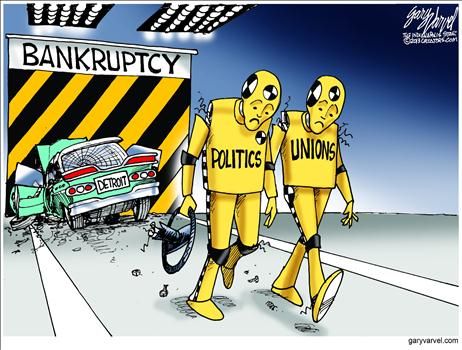
Contrary to the endless columns blaming the “model cities” initiative for the Detroit bankruptcy, in reality, secular progressives manufactured the conditions that could only have led to this bankruptcy long before the idea was ever conceived. To be sure, the “model cities” initiative accelerated and exacerbated the failures of progressivism in Detroit, and is a real-life manifestation of the failures of theoretical progressivism, but something much more fundamental and sinister has been at play for over a hundred years.
When Max Weber arrived on the shores of America in 1904, he knew immediately that his thesis had been correct. The Protestant Ethic and the Spirit of Capitalism permeated throughout American cities, a “calling” to labor intensely manifested in a culture that moved with a purpose, leaving secular European counterparts lagging far behind in gross national product. But even before Weber set his course, an intentional effort was underway – brewing under the surface of the Progressive Movement.
Even though progressives boast pension reform and workers’ rights accomplishments, Americans in the latter 19th century largely understood these early efforts were attempts to undermine the American system, a subversion of our culture and way of life. The problem early progressives had in bribing workers with goodies, was that American workers didn’t want pensions, in fact, there was no such thing as retirement.
That may seem inconceivable to modern Americans, but it is absolutely true. Enter the labor unions. The rise of big labor was interdependent with the establishment of federal pensions in American political history, specifically during the Progressive Era. But pension reform was not the goal as they claimed it to be. In truth, the goal was to amend the Constitution to allow the federal government to directly tax individuals, which Pollock v. Farmers’ Loan & Trust Co. (1895) correctly identified to be unconstitutional.
The Supreme Court protected the citizens in Pollock, whose money would be used to fund corrupt cronyism, and as progressive Nebraska Senator Norris Brown stated, the goal was to adopt an amendment “which will give the court a Constitution that cannot be interpreted two ways.” Enter the Sixteenth Amendment. I know it is all rather confusing, but bear with me.
With a new revenue stream progressive politicians could funnel federal payments to special interest groups – mainly labor unions and big-business – and enact regulations (i.e., tariffs, etc.) that offered their friends a competitive economic advantage. In return, labor unions would organize political support for progressives. There were just a few unfortunate obstacles standing in the way of this corrupt partnership.
First and foremost, the Constitution, which gave state legislatures the power to elect national senators and had an inconvenient habit of tossing out career crony politicians. If special interest groups could just elect the senators themselves, then they would not have to continue to spend so much money bribing new politicians. Enter the Seventeenth Amendment, which established direct senatorial elections, bypassing the very necessary state legislatures.
Again, the labor unions had yet another problem ginning up support for candidates who supported these two amendments – that pesky Protestant Ethic-based culture, which demands personal productivity and responsibility. While labor sought out younger workers to amass sufficient numbers to increase political influence, as far as older workers were concerned, employment was enough to be content as it provided a higher standard of living than pensions and satisfied their duty to labor. A general acceptance among historians, although you would never know from modern political debate on labor issues, is that the Protestant culture of white older workers made labor interests difficult to achieve. Historian William Graebner, wrote of the choice that faced employers in the late 19th century:
For employers, this meant that older workers would be more likely to resist ‘outside influences and agitation’…
Older white workers – because racist labor unions did not allow black Americans to become members – were not okay with union agitation for political purposes. They simply wanted to work and earn a living, and pensions were seen as a handout that offered little quality of life, and frankly Americans understood that they promoted idleness. So, progressives threw them out of the labor force, plain and simple.
From Rich’s book, “Our Virtuous Republic: The Forgotten Clause in the American Social Contract.” It is certainly worth mentioning that the progressive agenda throughout the 20th century advanced toward the same goal, and as of April of 2013, the labor force participation rate for all adults age 65 and over , is only 6.9 percent.In 1880, the labor participation rate for men age 65 and older stood at 78%, which represented a 2% increase from the prior three decades. During the period from the 1880’s – 1930’s, labor successfully lobbied for mandatory retirement legislation in labor prone industries. Older workers certainly resisted labor’s efforts, but industry cost cutting concerns, labor agitations, federal legislation, and so on, began to force them out. In the now-relevant case of Detroit and the automobile industry, older workers were not exactly begging for an old-age pension. In reality, quite the contrary was true. Embedded within the work habits of the American labor force was the idea of their duty or calling to labor, and indeed, they wanted to work:
During the springtime rehiring season in Detroit, stores stocked extra supplies of black shoe polish, which older workers daubed on their hair to disguise tell-tale patches of gray.
We can all tell by the graph and our common sense that the Progressive Movement largely succeeded in their efforts. Older workers were forced out of the labor force, young agitators brought the economy to a grinding halt and supported candidates who promised state and federal pension benefits. Of course, the end game was to ensure the election of a progressive Congress that would amend the Constitution to make pork projects cheaper to obtain, which are now funded by your tax dollars.
The passage of the 17th Amendment was part of a logrolling deal with the 16th amendment, which affirmed the constitutionality of unapportioned progressive federal income tax. Although sold as an anti-corruption and anti-special interest amendment, the entire narrative is a sham. Because of the seniority system within our Congress, the amendment made it cheaper and easier to send back senators who would protect the legislation prior members passed, and the result was an explosion of average Senate tenure.
From Rich’s book, “Our Virtuous Republic: The Forgotten Clause in the American Social Contract.” After the Munn vs. Illinois decision, which vastly expanding the regulating authority of Congress, average tenure increases because of the added attraction. Nevertheless, state legislatures successfully restrained careerism until the ratification of the Seventeenth Amendment.So, what we have is the explosion of careerism that never could or would have occurred if not for union collusion. Thanks to the Progressive Movement, which brought us two corrupt amendments disguised as legislative progress, the federal government had the money, power, and authority to bail out the Detroit auto-industry. Yet, they are still broke financially and morally, and worse, the proliferation of policies that promote idleness and entitlement have been embedded alongside the Protestant Ethic.
Americans’ views of organized labor have consistently soured over the years, with a historically low approval nationwide, and Americans voicing the least amount of confidence in organized labor since Gallup began their Confidence in Institutions measurement. They rank 3rd to last out of all 16 societal institutions, even below big business, which is right next to HMOs and Congress. Yet, we are still so far away from where we began as a nation, when unions were outlawed in many colonies for obvious reasons. Factions, as Adam Smith called them, were unhealthy in society, because they promoted greed, idleness and violence.
Sounds about right, doesn’t it?
“People of the same trade seldom meet together, even for merriment and diversion, but the conversation ends in a conspiracy against the public, or in some contrivance to raise prices. It is impossible indeed to prevent such meetings, by any law which either could be executed, or would be consistent with liberty and justice. But though the law cannot hinder people of the same trade from sometimes assembling together, it ought to do nothing to facilitate such assemblies; much less to render them necessary.” – Adam Smith




